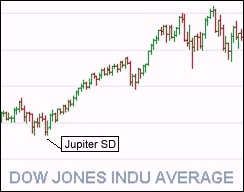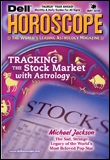
advertisements
Tracking the Stock Market
with Astrology
by Michael O'Reilly
What astrological factors influence market trends? Here's Part Three, an excerpt from the full length article featured in the cover story of Dell Horoscope magazine's May 2010 issue...

NeptuneCafe presents

Advertise on this site.
For more info, email wolfstar@neptunecafe.com
Blending Planetary Cycles with the U.S. Horoscope
In 2009, many financial astrologers saw the Saturn-Uranus opposition and the Saturn-Pluto square as powerful negative factors on market sentiment. While historically these outer planet stresses tend to correspond to bearish market conditions, a few contrary influences suggested that the bull market that started on March 6, 2009 would continue right on through the more bearish signals. Jupiter was one of those since it was transiting through the fourth house between the IC and the Moon, and hitting some vibrant midpoints between these two. In my weekly column dated July 6, 2009, I wrote about this Jupiter transit: "Jupiter will turn direct in mid-October very near the U.S. fourth house cusp, likely bringing a return of confidence." (see business).
What happened around this time was that on October 14, 2009 the Dow edged over 10,000 for the first time in over a year. A collective sigh of relief could be heard across Wall Street as portfolio managers were starting to make back what they had lost during the catastrophic meltdown. Most financial astrologers were baffled by this development, since Saturn and Uranus opposed each other in September 2009, and Saturn and Pluto squared each other in November 2009. How could the market keep trending up during these tense outer planet dynamics?
The other indicator that sustained the bullish trend was Pluto. Pluto was (and is) in a long-term opposition to the U.S. Venus and Jupiter. Recall that the first time Pluto opposed the U.S. Venus was at the very bottom of the financial collapse. President Obama reiterated the Bush administration's strategy of bailing out Wall Street, and consequently poured $billions into the banking industry. The top tier of investment banks were deemed "too big to fail", and whether one agrees with this plan or not, the result was a flooding of cash into the market system. That money had to go somewhere, and leading the entire financial system out of the pits were the same large banks that nearly ruined the economy.
And so one might say that Pluto in Capricorn trumps all the other outer planets because this is the indicator that the government is the dominant player. And as long as it's spending $billions to stimulate the economy, one can expect the markets to respond favorably. This is not to say that the Saturn-Uranus and Saturn-Pluto aspects were nullified. They were deeply felt by many Americans, especially the 17 percent that were un- or under-employed, and for those who lost their homes or who were underwater on their homes' values. What we had was a "jobless recovery", a divided society where those with money to invest did well, and those who were looking for work floundered.
The U.S. horoscope reflects that unemployment problem. In the sixth house of jobs, the U.S. has Chiron at 20º Aries, where it opposes Juno in the 12th house and squares the Mercury-Pluto opposition. Chiron has some beneficial aspects as well, but its condition of being at the center of a Grand Cross can bring problems. By secondary progression, Venus in 2009 was nearing a conjunction with Chiron after it opposed progressed Mars in the 12th house. This is the underlying picture that describes the employment problem. It should begin clearing up when progressed Venus passes the U.S. Chiron in late 2010.
A major concern remains, and that is Pluto's opposition to the U.S. Jupiter in 2010 and 2011, and Saturn's square to the U.S. Jupiter in September 2010. After that, transiting Uranus will square the U.S. Venus and Jupiter in 2011 and 2012. When challenging planetary cycles align with the U.S. horoscope, you can expect problems. Since the financial planets Venus and Jupiter are in the financial 8th house, these problems will most likely be about the economy. Pluto's influence indicates that huge sums of money will be involved. The eighth house is about credit and debt, so most likely we're talking about a ballooning national deficit that could cripple the economy.
On the plus side, transiting Jupiter and Uranus will be conjunct for much of 2010, which is often favorable for technology companies, especially those with the prospects to change our collective future. Also, these two planets forming a square to the U.S. Venus-Jupiter represent the loosening grip of the government. The trick to maintaining a healthy economy is the handoff from the government stimulus packages to self-sustaining, organic business growth. The Jupiter-Uranus square suggests a time frame when this might happen.
At any one time, one can find a variety of indicators using planetary cycles, transits and progressions to the NYSE chart, and transits and progressions to the U.S. horoscope. When all three of these methods are showing similar developments, then you have a definite trend or turning point. The U.S. mind-set is largely centered on business developments, and so major transits and progressions to the U.S. horoscope often translate directly into market conditions. A Scorpio Ascendant and four planets in the eighth house reflect the nation's focus on capitalism, which in essence, is about leveraging money.
As transiting Pluto drew within orb of its opposition to the U.S. Venus and Jupiter, we experienced the near collapse of the entire economic system when a handful of hedge fund traders super-leveraged American homeowners' pooled mortgages. Until these speculative derivatives are regulated, we could again teeter over the abyss. I don't think the planetary conditions can indicate for certain whether we will emerge from these trying times with our savings intact or not.
The transiting Saturn-Pluto square offers the celestial opportunity to rein in those who leverage the entire economy for their personal gain. Squares and oppositions mean change, and not necessarily unfortunate change. Government management can be a good thing, but in our free market system, it's also important for the government to get out after its job is done.
So, the developing T-square between Saturn, Uranus and Pluto over the next two years hits the U.S. Venus-Jupiter conjunction. Pluto, representing the government as the dominant player, must balance the need for regulation and targeted stimulus (Saturn) with the need for the business community to grow itself, free of interference and deficit-inducing supports (Uranus). That's a tall order, since the nation's economic health depends on an enlightened, agile government more than ever. 



For more info, see U.S. Scorpio Rising

The May 2010 cover story for Dell Horoscope magazine was written by NeptuneCafe's resident astrologer, Michael O'Reilly. You can read excerpts here, or visit dellhoroscope.com to request the full article
Part One - Charting the Financial Trends explores the three horoscopes generally used by financial astrologers to explain market cycles: the DJIA, NYSE, and the U.S. chart.
Part Two - A Case Study: The March 6, 2009 V-Shaped Bottom examines the the Dow's top just above 14,000 and its reversal on March 6, 2009 using the NYSE horoscope.
Part Three - takes a look at the U.S. horoscope's role in financial history, and focuses in on the V-Shaped reversal to highlight its relevance in long-term cycles.
Part Four - (below) Blending Planetary Cycles with the U.S. Horoscope suggests a method to better track and forecast market trends.
